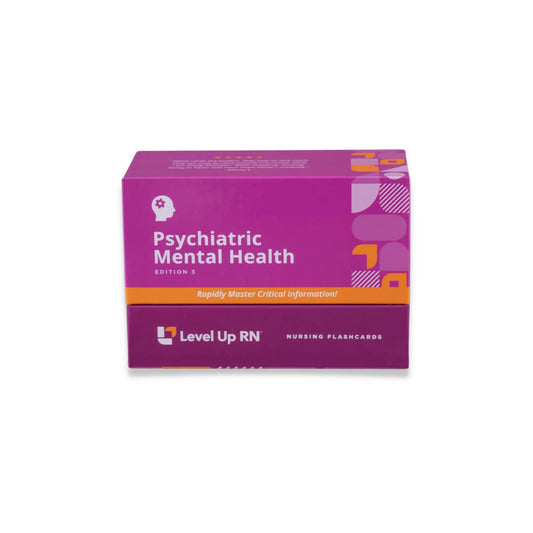Psychiatric Mental Health, part 26: Disorders - Anxiety Disorders
Generalized Anxiety Disorder (GAD). Symptoms, diagnosis, treatment, and nursing care of generalized anxiety disorder. Specific anxiety disorders, including social anxiety disorder and agoraphobia.
Full Transcript: Psychiatric Mental Health, part 26: Disorders - Anxiety Disorders
Full Transcript: Psychiatric Mental Health, part 26: Disorders - Anxiety Disorders
Hi, I'm Cathy with Level Up RN. In this video, we will be discussing generalized anxiety disorder, as well as a few key specific anxiety disorders. And at the end of the video, I'm going to give you guys a little quiz to test your knowledge of some of the key points I'll be covering, so definitely stay tuned for that. And if you have our Level Up RN Psychiatric Mental Health Nursing Flashcards, I am just starting in the disorder section of this deck.
Everyone experiences anxiety from time to time and that is a normal thing. However, with generalized anxiety disorder, or GAD, an individual will have persistent and excessive worrying that will cause significant physical and/or psychological symptoms. Females are more likely than males to experience generalized anxiety disorder, and symptoms include excessive anxiety and worrying that lasts for more than six months, as well as symptoms such as fatigue, restlessness, irritability, muscle tension, as well as insomnia. In terms of diagnosis, it's important to rule out any underlying disorders, such as hyperthyroidism. Treatment can include talk therapy, as well as cognitive behavioral therapy, or CBT. I covered CBT in a previous video in this playlist, so if you need a review of that therapy then definitely check that out. Medications used in the treatment of generalized anxiety disorder include SSRIs, SSNRIs, as well as benzodiazepines and atypical anxiolytics such as buspirone.
In terms of nursing care, we want to teach our patient how to recognize the signs of escalating anxiety and teach them interventions to help decrease their anxiety, such as deep breathing and exercise. It should be noted, however, that if a patient is experiencing severe or panic-level anxiety, then problem-solving is not going to be possible and our nursing care should really be focused on the patient's safety as well as their physical needs.
Moving on to specific anxiety disorders now. Two specific anxiety disorders that I would be familiar with include social anxiety disorder and agoraphobia. With social anxiety disorder, an individual will experience anxiety related to social situations due to fear of humiliation or rejection. Agoraphobia translates to fear of the marketplace, and an individual with agoraphobia will experience anxiety related to public transportation, crowds of people, and being outside the home. Some patients have anxiety that is produced by a specific object or situation. For example, arachnophobia is the fear of spiders and claustrophobia is the fear of confined spaces. Treatment of specific anxiety disorders can include behavioral therapy, such as systematic desensitization and anti-anxiety medications, which we covered earlier in this video.
All right, it's quiz time. Are you guys ready? Question number one. Is generalized anxiety disorder more common in females or males? The answer is females. Question number two. Name one or more drug classes that are used to treat generalized anxiety disorder. All right, if you said SSRIs, SSNRIs, benzodiazepines, or atypical anxiolytics, such as buspirone, then you are right. Question number three. What do you call anxiety that is produced by fear of public crowds and being outside the home? The answer is agoraphobia.
All right, that is it for this video. I hope you found it helpful. Take care and good luck with studying. Two specific anxiety disorders that I would be familiar.


